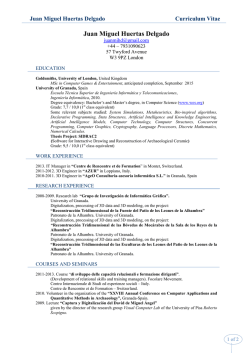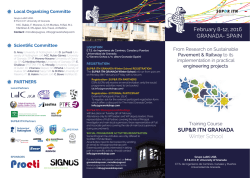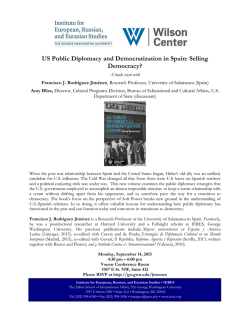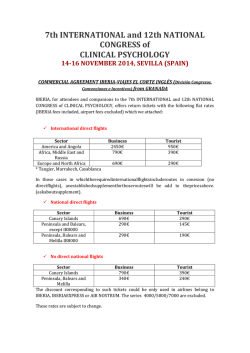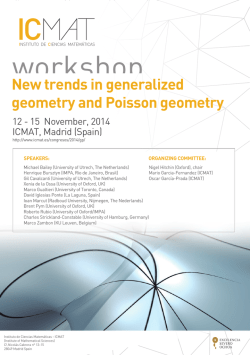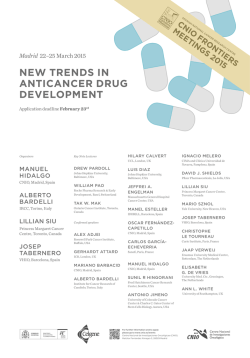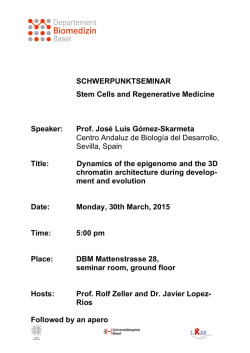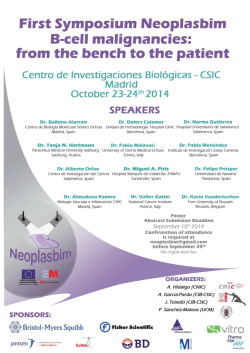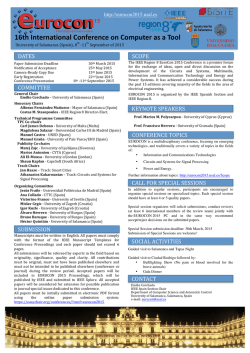
ena postgraduate course 2016 nutrenvigen
ENA POSTGRADUATE COURSE 2016 NUTRENVIGEN-G+D FACTORS MASTER 2016 ROLE OF EARLY NUTRITION ON NON-COMMUNICABLE DISEASES DEVELOPMENT Salón de Grados B – Tower B – 1st Floor School of Medicine. Health Sciences Technological Park University of Granada Avda. de la Investigación, 11 -18016 - Granada PROGRAM Granada, 4-5 May, 2016 1 INTRODUCTION Over the past 10 years, the Early Nutrition Academy (ENA) has organised a series of highly successful Symposiums, Trainings and Postgraduate courses for young scientists with a commitment to paediatric nutrition research, which have been held about every year. These courses have provided up-to-the-date scientific information, trained communication and presentation skills, helped younger academicians to network and build careers in the field, and provided enthusiasm to the participating scholars. The ENA, supported by several of the most prestigious researches in the field in Europe, was designed to: • Offer a comprehensive Curriculum on mother-infant and paediatric nutritional programming research, literature, and clinical trials. • Provide well-founded advice on the prevention, diagnosis, and management of early nutrition programming of adult diseases. • Offer unique opportunities to learn from and interact with expert faculty from various International Centres, as well as from participants from around the world interested in early nutrition programming. • Serve as an introduction to the new opportunities in Early Nutrition Programming research. This new ENA Postgraduate Course will be held in Granada during 4th-5th May 2016 with the main topic: “Role of early nutrition on non-communicable diseases development” The organising team consists of Prof. Berthold Koletzko, head of the Nutrition and Metabolism Division at the Ludwig-Maximiliams University of Münich, and Co-ordinator of the EU FP7 EarlyNutrition Project and President of the Early Nutrition Academy (ENA) and Prof. Cristina Campoy at the University of Granada, Director of the EURISTIKOS Excellence Centre for Paediatric Research, who in collaboration with her local team, will make this event a reality. The course has been also supervised, approved and scientifically supported by the ENA members, as well as by the European Commission. 2 VENUE These 2 days of Postgraduate Course will be held at the School of Medicine of Granada located at Health Sciences Technological Park, Avda. de la Investigación, 11 – 18016, Granada – Spain (www.ugr.es/~facmed/). DATES AND TIMES The ENA Postgraduate School will commence at 8:30 on Wednesday, 4th of May 2016, and will end on Thursday, 5th May 2016. COST: The fee for these 2 days of Postgraduate School is € 80 (Special fee for Students). The fee includes: • Participation in all activities of the course • Course materials • 1 meal & 2 coffee breaks per day • Diploma REGISTRATION The registration deadline is 30th April 2016. There is a limit of 45 places on the course. You can find the registration form or register on-line in www.earlynutritionmeeting.com, www.nutrenvigengd.com or www.project-earlynutrition.eu WHO SHOULD ATTEND THE POSTGRADUATE SCHOOL? The Course is designed to Master and PhD students and also for young investigators with previous knowledge or experience on clinical practice, nutrition and dietetic, sport medicine, basic science research related to pregnant women and paediatric nutrition, industrial stakeholders, and all those with an expertise linked to this field of research. ENA POSTGRADUATE SCHOOL LEARNING OBJECTIVES After the Postgraduate School, participants should: • Have a complete and updated overview of Nutrition impact on the risk for development of noncommunicable diseases. 3 • Have a current practical knowledge about the nutrition approach for preventing very common and chronic disorders. • Read critically and be able to discuss nutritional scientific literature. • Be familiar with emerging trends in Nutrition related to Obesity, CVD, Hypertension, … FORMAT The Postgraduate School will be a mixture of workshops, small group discussions and trainings in which participants will practice and develop their knowledge in the role of early nutrition on the development of non-communicable diseases, as well as the nutritional evidence-based medicine knowledge and skills. Informal social events will encourage free discussion and the establishment of ongoing links. TOPICS Main topic: “Role of early nutrition on Non-communicable diseases development” Sub-topics: 4 Patterns of optimal growth Obesity in children and adolescents Diabetes Mellitus – Insulin resistance Hypertension and cardiovascular diseases Brain Development, Mental performance and behaviour New epigenetic & metabolomic markers Mother obesity & diabetes and the offspring gut microbiota Breast feeding and later health Early nutrition and eating behaviour Optimal nutrition of the preterm baby How to create dietary patterns during childhood Role of chemical toxics and pollutants Importance of physical activity during pregnancy Communication and public health outcomes DEFINITIVE PROGRAM DAY TIME TOPIC SPEAKER/CHAIR 8:30 - 9:00 Registration and Welcome Introduction into the Course Chair: Enrique Herrera Research Vice-rector / Co-chair: Cristina Campoy 9:00 - 10:30 Workshop 1: Genetics and human development Chair: Richard Saffery 9:00 - 9:30 Epigenetics in human development and disease The genetics of early growth and its contribution to adult obesity and NCD “Omics” and early programming: placental transcriptome in lean and obese women Coffee break Training (Spanish) Internet como plataforma de divulgación científica Richard Saffery (Australia) 9:30 - 10:00 10:00 – 10:30 10:30 - 11:00 11:00 - 13:00 Day 1 Wednesday, 4 May 2016 13:00 - 14:00 14:00 – 15:30 14:00 – 14:30 14:30 – 15:00 15:00 – 15:30 15:30 – 16:30 16:30 – 18:00 16:30 – 17:00 17:00 – 17:30 17:30 – 18:00 21:00 Sylvain Sebert (Finland) Signe Altmäe (Estonia/Spain) Marián García-García (Spain) Lunch Workshop 2: Role of nutrition and physical activity on cognition and brain development Oral Supplementation of 2'-fucosyllactose during lactation improves memory and learning in rats Prenatal folic acid supplementation: effects on brain development at school age The role of exercise and fitness in cognition and brain development Chair: Cristina Campoy Elena Oliveros (Spain) Cristina Campoy (Spain) Francisco Ortega (Spain) Coffee break / Poster walk – Chairs: Sylvain Sebert & Signe Altmäe Workshop 3: Importance of microbiota and brown fat development in early programming Role of microbiota in early programming of offspring health and disease Brown fat development and its role in energy balance Brown Adipose Tissue as a target for Obesity treatment: Role of Melatonine Social Dinner Chair: Michael Symonds Ascensión Marcos (Spain) Michael Symonds (UK) Ahmad Agil (Spain) 5 DAY TIME TOPIC SPEAKER 9:00 – 10:30 Workshop 4: Micronutrients and dietary patters in early life and childhood Chair: Wendy Oddy 9:00 - 9:30 9:30 -10:00 10:00 - 10:30 10:30 - 11:00 11:00 – 13:00 11:00 - 11:30 Day 2 Thursday, 5 May 2016 11:30 - 12:00 12:00 - 12:30 12:30 - 13:00 13:00 -14:00 Harry McArdle (UK) Marta Zaragoza (Spain) Wendy Oddy (Australia) Workshop 5: Prevention of Obesity in children and brain development Chair: Luis Moreno How should we prevent obesity in children? Brain development of children born to obese and diabetic pregnant women Luis Moreno (Spain) Jose P. Martínez-Barbero (Spain) Dysbiosis and its pathological consequences: from infancy to adulthood Rosaura Leis (Spain) Gut microbial phylogenetic and functional dynamics associated to obesity Lunch 14:00 – 15:30 Workshop 6: Foetal programming & toxics during development 14:00 – 14:30 Molecular basis of foetal metabolic programming 14:30 - 15:00 Metals and neurodevelopment in Mexico 15:00 – 15:30 Inadvertent human exposure to endocrine disrupting chemicals 15:30 -16:30 6 The importance of micronutrients for foetal development and the consequences of micronutrient deficiency during pregnancy Micronutrient intake adequacy in European children from birth to 8 years. Influence of calcium intake on bone mineral density Dietary patterns in early and later childhood and health outcomes Coffee break Antonio Suárez (Spain) Chair: Nicolás Olea Elvira Larqué (Spain) Horacio Riojas-Rodriguez (Mexico) Nicolás Olea (Spain) Coffee break – Poster walk – Chairs: Harry McArdle & Nicolás Olea 16:30 – 17:00 Last talk and Closing event 16:30 - 17:00 Public private collaboration in research 17:00 – 17:30 Closing event Chair: Berthold Koletzko Co-Chair: Cristina Campoy Berthold Koletzko (Germany) Cristina Campoy (Spain) Berthold Koletzko (Germany) Organisers: Cristina Campoy, Prof., MD Department of Paediatrics. University of Granada. Spain Berthold Koletzko, Prof., MD Department of Paediatrics. Ludwig-Maximiliams University of Münich, Germany Honour Committee Rector of the University of Granada Research Vice-rector University of Granada Dean of the School of Medicine. University of Granada SPEAKERS (in alphabetical order): Prof. Ahmad Agil Department of Pharmacology. Neurosciences Institute University of Granada, Spain Dr. Signe Altmäe Department of Paediatrics EURISTIKOS Excellence Centre for Paediatric Research University of Granada, Spain Prof. Cristina Campoy Department of Paediatrics Director of the EURISTIKOS Excellence Centre for Paediatric Research University of Granada, Spain Dr. Marián García-García Pharmacist by Madrid Complutense University Scientific Informative Expertise Prof. Berthold Koletzko Department of Paediatrics. Ludwig-Maximiliams University of Münich, Germany Prof. Elvira Larqué Department of Animal Physiology. Faculty of Biology. University of Murcia, Spain Prof. Rosaura Leis Department of Paediatrics University of Santiago de Compostela, Spain Prof. Ascensión Marcos Institute of Food Science and Technology (ICTAN) - CSIC Madrid, Spain Dr. Jose P. Martínez-Barbero Neuroradiologist University of Granada, Spain 7 Prof. Harry McArdle Department of Physiology University of Nöttingham, UK Prof. Luis Moreno Department of Paediatrics. Director of GENUD (Growth, Exercise, Nutrition and Development) Research Group EU Ciencias de la Salud, Universidad de Zaragoza, Spain Prof. Wendy Oddy, PhD BAppSci MPH Unit of Nutrition and Dietetics, Public Health, Epidemiology University of Western Australia, Perth, Australia Prof. Nicolás Olea Director of the BioHealth Institute (Ibs), San Cecilio University Hospital, Granada, Spain CIBER Epidemiología y Salud Pública (CIBERESP), Madrid, Spain Dr. Francisco Ortega Department of Physical Education and Sports University of Granada, Granada, Spain Department of Biosciences and Nutrition at NOVUM, Karolinska Institutet, Huddinge, Sweden Dr. Elena Oliveros Abbott Nutrition, R&D, Abbott Laboratories, Granada, Spain Dr. Horacio Riojas-Rodríguez Dirección de Salud Ambiental, Centro de Investigación en Salud Poblacional Instituto Nacional de Salud Pública. Cuernavaca, Morelos, México Dr. Richard Saffery Murdoch Children’s Research Institute Head of Cancer & Disease Epigenetics (CDE) laboratory The Royal Children’s Hospital in Parkville, Melbourne. Australia Prof. Sylvain Sebert Institute of Health Sciences University of Oulu, Finland Prof. Antonio Suárez Department of Biochemistry and Molecular Biology Biomedical Research Centre (CIB) University of Granada, Spain Prof. Michael Symonds Deputy Head of School of Medicine, Faculty of Medicine & Health Sciences Queen's Medical Centre Nottingham, UK Dr. Marta Zaragoza Department of Paediatrics University of Rovira i Virgili, Reus, Spain 8 TRAVEL INFORMATION Rich in both history and culture, Granada is an ideal holiday destination for anyone looking to visit Spain. With historical monuments and relaxing gardens to explore, it's easy to see why so many travelers are keen to find cheap flights to Granada or Málaga. This beautiful city occupies one of the most historically diverse destinations in Spain and so anybody looking to delve into the past can count on an unforgettable experience among Granada's many fascinating buildings and monuments. Getting around Granada is also very easy. The bus and train networks are excellent and are also relatively inexpensive, making them ideal for exploring the city. However, visitors should not discount exploring the place on foot. Many of the local attractions are central and in any case wandering through the city's cobbled streets gives one an opportunity to explore the city in a relaxed manner. The nearest airport is the airport of Granada-Jaén (Federico García-Lorca) (Phone: 0034-958 245 200), located 15 km from the city centre of Granada. You will probably have to take a connection flight via Madrid or Barcelona. Iberia (www.iberia.es), Spanair (www.spanair.com) and Ryanair (www.ryanair.com) offer frequent flights. Flights from and to the UK and some other important European cities are being offered. From Granada airport, a taxi to Granada city center costs from 25.00 € in a four seats taxi to 35.00 € in a six seats taxi would (one way). The bigger and better International airport closer to Granada is the Málaga Airport (Pablo Picasso AGP); it is about 1.5 hours away by car from Granada. If you arrive at Málaga airport you can easily find bus connections to Granada or by taxi. How to move along Granada (TAXI / BUS) All the taxis in Granada are official and sure. Companies and telephones -Tele-Radio-Taxi +34 958 280 654 (12 lines) -Radio Taxi G.S.L. +34 958 132 323 (24 hours) -Servi-Taxi (Permanent service for Granada) +34 958 400 199 LANGUAGE The official language of the International Symposium will be English. WEATHER The weather and climate in Granada is extremely sunny, warm and enjoyable, with mild winters and hot summers. The spring weather and climate in Granada is pleasant, with average temperatures ranging from 8ºC to 25ºC in May. A popular time of year to visit, spring in Granada brings a number of rain showers, together with cold nights, when coats are necessary, but warm weather at midday. 9 HOTEL INFORMATION • HOTEL NAZARÍES ***** www.hotelnazariesgranada.com/ C/ Maestro Montero, 12. 18004-Granada Tel. (0034) 958 187 600 Fax. (0034) 958 187 601 WEBSITES INFORMATION www.spain.info www.turismodegranada.org 10
© Copyright 2026
